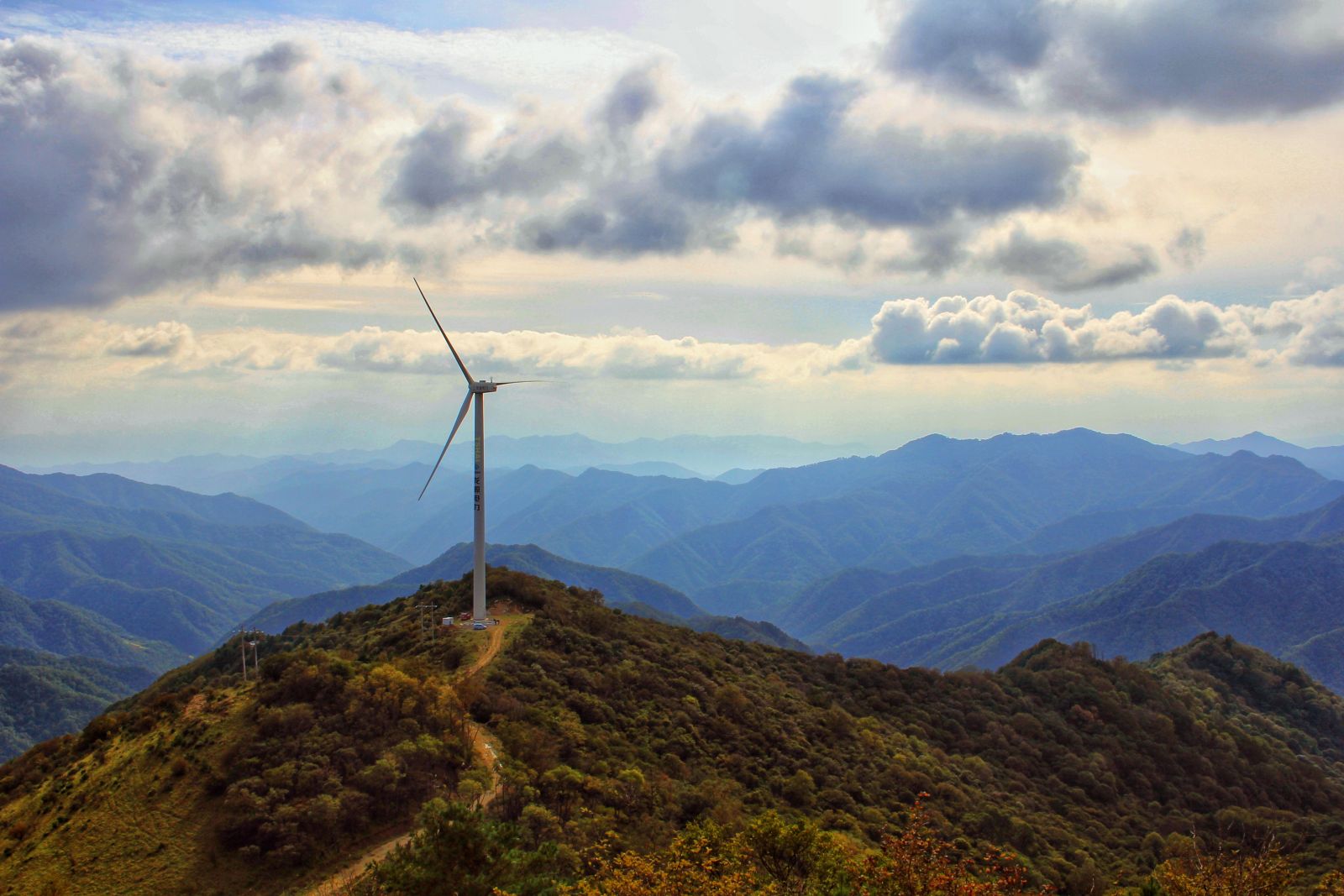Chinese Name: 秦岭 Pronunciation: Qínlǐng
Time Needed: 1-2 Days
Peak Elevation: 3771.2
Ticket Price: Free
Service Time: All seasons
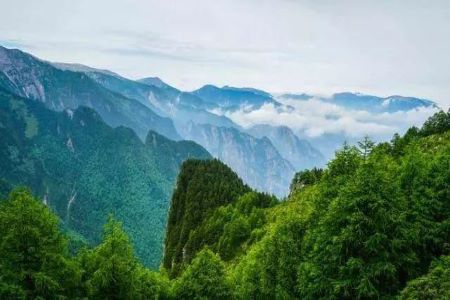
Among the big mountains in China, Qinling Mountains is the most special one. If people describe the Yellow River as the mother river of the Chinese nation, then Qinling Mountains is the father mountain. It is one important symbol of Chinese civilization.
Legend has it that the name of Qinling Mountains could be dated back as early as the Eastern Zhou Dynasty (770BC-256BC). It is vast, grand, and magnificent. It extends from Lintao County in Gansu Province in the west to the south of Shaanxi and ends in Lushan County in Henan Province in the east.
Qinling Mountains is 1,600 kilometers long from east to west, and about 300 kilometers wide from south to north. Six cities, Xi’an, Baoji, Weinan, Hanzhong, Ankang, and Shangluo of Shaanxi Province are located along the Shaanxi segment of Qinling Mountains. Its main peak is Mount Taibai (3771.2 meters) in Baoji City.
Many events happened in Qinling Mountains. The early Chinese ancestors, such as Emperor Yan, Emperor Yellow, and Fuxi, spent their days in the northern region of Qinling Mountains. A total of 13 dynasties established the capital in Xi’an. The ancient Silk Road also started here. The Book of Songs and many other Chinese classics originated in the Qinling Mountains area. The inventions of Chinese characters and paper-making appeared in the region.

Qinling Mountains serves as an important ecological security barrier. Because of the geographical differences in the north and the south of Qinling Mountains, Qinling-Huai River Line has become the most important north-south boundary of Chinese geography. In winter, Qinling Mountains can block the cold wave from entering the south and in summer, the moist sea breeze is blocked from entering the northern region.
Apart from this, Qinling Mountains has been a military barrier of vital importance in history, which makes it one mountains with the most war stories in Chinese history.
There are many world-famous mountains and scenic spots, typified by Zhongnan Mountain, Mount Hua, the Caotang Temple, and Niubeiliang National Nature Reserve.
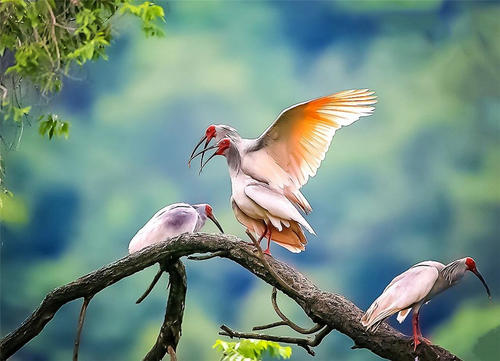
There are some precious wild animals like pandas, golden snub-nosed monkeys, and golden takins in the region, and first-grade state protection animals such as crested ibis and black stork. Among them, pandas, golden snub-nosed monkeys, golden takins, and crested ibis are called “the four treasured animals in Qinling”.
Qinling Mountains is rich in mineral resources, such as molybdenum, nickel, vanadium, barite, and limestone. Orthoclase reserve here ranks the first in all provinces and the second in the world.
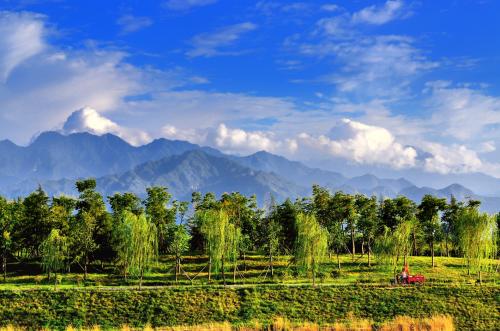
Zhongnan Mountain, with a peak height of 2,604 meters, is located in Shaanxi Province and is a segment of Qinling Mountains. It is an important geographical symbol of China. Boasting unique climatic and geological conditions as well as abundant and diverse animal and plant resources, the mountain is a Class 4A Tourist Spot in China.
Mount Hua, also known as “West Mountain” in ancient times, is one of the “Five Great Mountains” in China. Its main peaks, the East Peak, the West Peak, and the South Peak are surrounded by various small peaks. It is famous for its steepness and enjoys the fame of “the most rugged mountain in the world”.
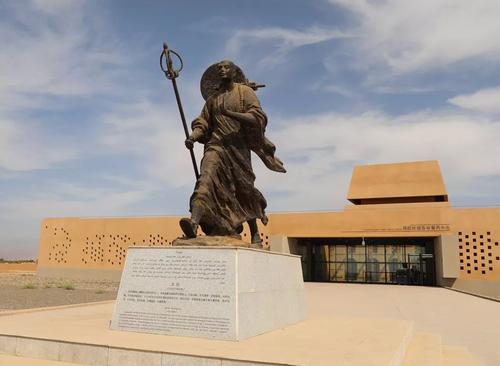
Xuan Zang (602-664), a famous translator, traveler, Buddhism master, and the pioneer in Sino-Indian cultural exchange in the Tang Dynasty (618-907), went to India for Buddhist scriptures when he was 27. When he crossed Qinling Mountains, he was astounded by the majestic, huge, and grand scenery.
When he translated the Buddhist texts into Chinese in the Daxingshan Temple in Xi’an, Xuan Zang could enjoy the view of Qinling Mountains every day. It is said that he once asked his disciples to bury him at the foot of Qinling Mountains after his death. Following his will, Emperor Gaozong (628-683) of the Tang Dynasty ordered to bury his osseous remains in the Bailu Plain in the Qinling Mountains area.
The best visiting time is from May to October. In May, the weather is not very hot, and flowers are blooming brightly.
From June to September, the mountains are cool and refreshing, which is suitable for summer vacation, playing water, and watching waterfalls.
In the middle of October, the leaves in Qinling Mountains are completely red, which is very beautiful. At this time, the rainy season is over, and the temperature is just right for a visit.
In summer, it rains a lot, and the temperature is low. Remember to bring a coat and an umbrella.
In winter, the temperature is mostly from 0 to 30 Celsius degrees, and down jackets should be prepared. It is best to wear snow non-slip cotton shoes or sneakers.
Chinese: 请带我去秦岭。English: Please take me to Qinling Mountains.
If you go to Qinling Mountains from the center of Xi’an (Grand Noble Hotel Xi’an), it takes about 2.5 hours (about CNY 340).
If you go to Qinling Mountains from Xi’an Xianyang International Airport, it takes about 2 hours (about CNY 270).
If you go to Qinling Mountains from Xi’an North Railway Station, it takes about 2 hours (about CNY 270).
If you go to Qinling Mountains from Xi’an Railway Station, it takes about 80 minutes (about CNY 230).
